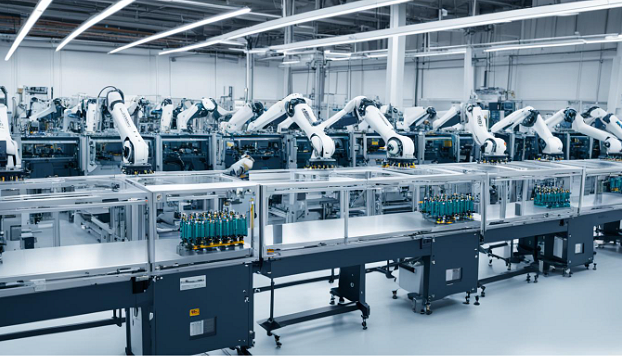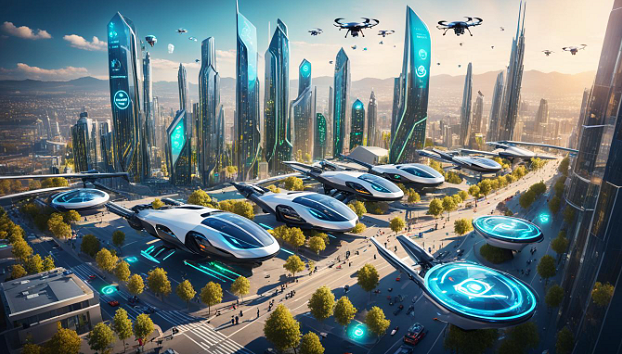AI’s Impact on the Job Market: What You Need to Know
The job market is undergoing rapid transformation, with artificial intelligence (AI) playing a pivotal role. At vpnmentor.com, we recognize that while some view AI as a threat to employment, the reality is far more nuanced. Understanding AI’s impact on jobs and the opportunities it presents is crucial. What does the future hold for workers in an AI-driven world?

AI has revolutionized numerous industries, automating certain jobs while simultaneously creating new ones. It’s reshaping how we work and the skills we need. Emerging roles such as AI ethicists, machine learning engineers, data analysts, and cybersecurity experts are becoming increasingly prevalent.
To gain a comprehensive understanding of AI’s impact across various sectors, our team interviewed experts from different industries. Their insights provide a nuanced perspective on the challenges and opportunities presented by AI in the job market.
AI Adoption and Its Impact on New Job Creation
AI is changing the job market in a good way. It’s creating many new, high-demand jobs for skilled people. In many fields, we see more AI companies and their specialized workforce. These companies are looking for people with skills in data analytics, robotics, engineering, big data analysis, and IT.
Harry Green from Ai2people offers valuable insights on this topic:
“One of the most immediate impacts of AI is job displacement, particularly in sectors reliant on repetitive tasks such as manufacturing, data entry, and certain aspects of customer service. Automation can increase efficiency and reduce costs, but it also risks making certain jobs obsolete. For example, the rise of AI-powered chatbots and virtual assistants may reduce the need for traditional customer service roles.
However, it’s crucial to note that while some jobs may be lost, AI also has the potential to transform existing roles. Workers in impacted industries may need to shift towards more complex tasks that require creativity, problem-solving, and human judgment—skills that AI currently cannot replicate. This transition may involve upskilling or reskilling to work alongside AI systems effectively.
AI is also expected to create new job opportunities. These include roles in AI development, data science, cybersecurity, and other tech-related fields. Moreover, as AI enables new capabilities, it can foster the growth of industries that previously didn’t exist, such as personalized medicine, smart infrastructure, and autonomous transportation.”
Alejandra, Head of Marketing at Straico, emphasizes the importance of human-AI collaboration:
“The expected impact of AI on the job market is significant. AI is set to take on tasks previously done by humans, as clients find it more practical and cost-effective.
However, this doesn’t mean all jobs will disappear. Straico’s vision incorporates the concept of human in the loop – where humans work alongside AI, creating a synergy that enhances productivity and innovation.
Humans empowered by AI can achieve unprecedented levels of effectiveness. While AI can handle data-driven tasks and automate repetitive processes, the human element adds creativity, critical thinking, and emotional intelligence. This combination is powerful and vital for future workplaces.
Professionals should focus on enhancing their creative and strategic skills, leveraging AI as a tool to amplify their capabilities rather than a replacement. By doing so, they can stay relevant and contribute uniquely in ways that AI alone cannot.”
AI’s Broad Impact Across Industries
AI’s influence extends far beyond the tech sector, reshaping various industries and creating new opportunities. Alfonso D, Founder of tripleareview.com, provides a comprehensive overview of AI’s wide-ranging impact:
“AI is making waves across most aspects of our lives, benefiting numerous industries:
- In healthcare, it’s helping doctors diagnose and treat patients more effectively.
- In finance, it provides personalized advice and powers fraud detection.
- Factories use AI to streamline production and predict maintenance needs.
- Retailers use it for better inventory management and customer service, and they leverage AI cameras to deter theft.
- In transportation, AI is behind self-driving cars and smarter logistics.
- Schools use it to personalize learning,
- AI in Agriculture can enhance crop health and predict crop yields to maximize output and profits.
- Content industries (like entertainment, technology, eCommerce, etc) leverage AI for content creation and recommendations.
Specifically, Generative platforms like ChatGPT, Microsoft AI CoPilot, Jasper AI, Textcortex AI, Surfer AI, and Taskade automate tasks more efficiently. These powerful tools also help to rewrite job roles and set new expectations for IT workers.
These changes will bring new challenges and opportunities to the job market. AI taking over routine tasks means some jobs will change or disappear, but new ones will pop up. Manufacturing, logistics, and customer service jobs might see fewer traditional roles. On the bright side, we’ll also need more AI experts, data analysts, and AI DevOps roles.”
Navigating the AI-Driven Job Market
As AI continues to reshape the job market, professionals must adapt to stay relevant. Joey Trebif from Career Alley offers strategic advice for navigating this changing landscape:
“AI is about to revolutionize the job market, bringing both opportunities and challenges. It can boost productivity, create new job categories, and transform existing roles. However, it also poses a threat to jobs that involve repetitive tasks and routine decision-making.
Opportunities and Challenges
AI’s ability to automate repetitive, mundane tasks can empower professionals across various industries to focus on more strategic and creative endeavors. This shift has the potential to boost job satisfaction and even lead to the creation of entirely new roles requiring advanced skill sets. However, it’s important to acknowledge that some positions, particularly those in manufacturing, customer service, and data entry, may become more susceptible to automation, potentially leading to job displacement in these sectors.
Precautions and Strategies
To remain relevant in an AI-driven market, individuals should continuously upgrade their skills. Here are some strategies:
- Upskilling and Reskilling: Learn new technologies related to AI, data analysis, and machine learning through online courses and certifications.
- Emphasize Soft Skills: AI cannot replicate human emotions and interpersonal skills. Enhancing creativity, critical thinking, and emotional intelligence is crucial.
- Stay Informed: Keep up with industry trends and understand how AI is integrated into various sectors to anticipate and adapt to changes.
- Networking and Collaboration: Build a strong professional network and collaborate with AI systems and other professionals to innovate and grow in your career.
Steps Individuals Can Take
Investing in personal training and fostering a habit of continuous learning are crucial. Focusing on career development will help ensure a smoother transition to an AI-enhanced workplace. While AI will reshape the job market, proactive measures by individuals can mitigate potential downsides and harness the benefits. Continuous learning and skill development will be key to staying relevant and thriving in the future job market.”
AI in the Creative Industries
While AI’s impact on technical fields is well-documented, its influence on creative industries is equally significant. Sidsel Solmer Eriksen, Owner of Spread Studio, shares her perspective on AI’s role in creative businesses:
“The entrance of AI in the creative industries has primarily impacted the workflow and process–and set business relationships under a trust test.
The implementation of AI in creative businesses has primarily impacted jobs as an added tool to the existing toolbox. As the technology in itself still has way to go, the potential for creative industries is more one of refinement than a revolutionizing one–as it has the potential to be in industries like Life Science and Tech.
The creatives I know, use AI as a creative tool to generate new ideas or style elements for their existing design process. Or to turn the design process upside down, when using AI as a visualization tool to understand client needs better, which allows them to offer better design solutions as a result of their early insights.
In the era of implementing AI into existing business flows, trust will be paramount. The best way forward is to be very transparent about where and when AI, is applied, instead of hiding it, as this can backlash into the client/service relationship. I believe, that if we find ways to use AI as a third playmate in our business relationships, we can open doors to new and interesting outcomes, and possibly both win from it–across all industries.
As with any tool and technology, we need to familiarize ourselves with it, before rushing into conclusions about how it changes and transforms. Instead of building worst case scenarios of a dystopian future, where AI replaces human intelligence, we as humanity are all put the task of understanding that we are the stewards of how we want to use our new tool. The major question is up to us; how do we use AI to create a better world for all?
My hope and belief for the future of AI in the job market is, that we are still depending on human intelligence as the driver behind AI as a new tool in our human tool box. No matter the tool, the instrument still lies in the human ability to responsibly IMAGINE and CREATE a better world.”
Embracing the AI Revolution
As AI continues to evolve, its impact on the job market will only grow. Aman Singh from rdphostings.com offers an enthusiastic perspective on embracing this change:
“You know how Artificial Intelligence (AI) is totally shaking up the job market? It’s like a wave that’s automating boring tasks and creating a whole new wave of jobs. On one hand, some jobs are getting swept away by automation, but on the other hand, new roles like AI engineers and data scientists are popping up like crazy. Even the jobs that are sticking around are getting a makeover, requiring us to level up our creativity and problem-solving skills.
This AI revolution is happening everywhere, from developed countries to developing ones. Governments and schools need to team up to give workers who have been replaced by AI some new training and support. If you want to stay afloat in this AI-driven economy, you’ll need to keep learning and picking up skills that are in high demand. So, buckle up, embrace the change, and get ready for the future of work!
Precautions, Strategies, and Measures Professionals Can Adapt to Stay Relevant
- Stay on top of AI news: Keep tabs on the latest AI advancements and how they’re shaking up your industry.
- Level up your AI skills: Brush up on your machine learning and data analysis skills to make yourself a hot commodity in the job market.
- Embrace new AI roles: As AI reshapes the workforce, be ready to jump into fresh opportunities like AI trainers or data scientists.
- Play to your strengths: Focus on honing skills that AI can’t touch, like creativity, problem-solving, and critical thinking.
- Connect with your crew: Network with people in your field to stay on top of job openings and industry trends”

Conclusion
The rise of artificial intelligence is undeniably transforming the job market. As our expert interviews reveal, this transformation brings both challenges and opportunities. To thrive in this new landscape, professionals must embrace change, continuously update their skills, and focus on developing uniquely human capabilities that complement AI technologies.
The future of work will likely be characterized by increased human-AI collaboration, with AI handling routine tasks and humans focusing on creative, strategic, and interpersonal aspects of their roles. By staying informed about AI developments, investing in relevant skills, and maintaining a flexible mindset, workers can position themselves for success in the AI-augmented workforce of tomorrow.
As we navigate this AI-driven future, it’s crucial to consider the ethical implications of AI adoption and ensure that the benefits of this technology are distributed equitably across society. With the right approach, AI has the potential to not just change how we work, but to enhance human potential and create a more productive, creative, and fulfilling work environment for all.
React to this headline: